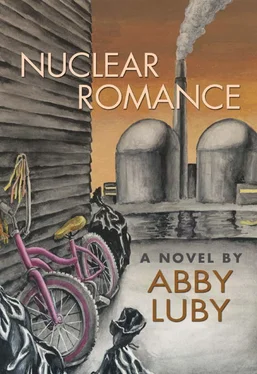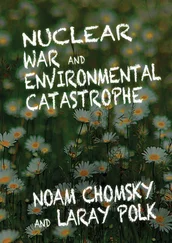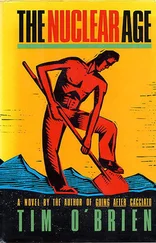The man froze. He took a few steps back and protectively put his arm in front of Ricky.
“Don’t touch anything, Ricky.”
With his eyes on the meter, he retraced lines around the pants, shirts, underwear, socks. Then he stopped.
“Why don’t we shut off the Geiger counter for now, Ricky. Know how to do that?”
The boy found the large black knob and clicked it off.
“Thanks,” Jeff said. “Is your mom home?”
The high-pitched squeak of sneakers scuffling on the gym floor punctuated the shouts and jeers as the visiting team scored. It was the end of the season for the local college basketball team, and they were down forty points. Every point scored by the opposition prompted a cacophony of boos and catcalls. It was a scene Lou Padera loved, and he furiously jotted down notes in his reporter’s pad.
Lou was senior sports reporter for the Daily Suburban, a major newspaper in Westchester County, just outside New York City. At thirty-nine, Lou had been on staff for over a decade. His byline was popular; his stories were an exciting play-by-play description that read like a quick-action adventure story. Whether it was about local sports, minor or major leagues, his stories were balanced, covering the winners as much as the losers. At the games, he was in high gear, edgy, clenching his chewing gum to combat his smoking habit.
This was a play-off game, and the gym was packed, spectators revved. The players shimmied and danced to the beat of the ball, harnessing its energetic momentum. Every hard-hitting bounce and speedy pass fueled the fiery fans, who bellowed out their shouts of approval or condemnation.
Plastering the walls of the gym were ads of local businesses; most were dwarfed and sandwiched in by the large, splayed blue-and-white banners promoting ALLPower, the local electric company. The utility company not only sponsored the games, they gave hefty sports scholarships.
A kid scored a three-pointer from center court, and cameras flashed like a wave of sparklers. Lou shot out of his seat, nodded to himself, and quickly scribbled on his pad. It was that vicarious thrill that summoned his own days on the college basketball court when he charged the defense and effortlessly dunked the ball. Those years fed his dreams for a life with the pros. As a boy growing up in a poor Italian neighborhood just outside a city in New Jersey, he surprised his coaches with his talent on the court. At first his teammates made fun of his height—a mere six feet, short by basketball standards. But his solid, square frame whisked around the court, ducking and scooping the ball out from under the hands of the giants. It was a different style of playing, almost sneaky. When he earned a college scholarship, it fed the hopes of his parents, who believed a sports career would guarantee Lou a better life. But after college, the young man repeatedly tried out for the pros but never made the cut. Frustrated after each painful rejection, he slowly saw his dream fade and end.
He learned to write about sports in fits and starts. In college he interned for a local radio station as their on-air sports reporter. At first he struggled with what words to use to describe the action. He always excelled as an athlete and never had to fully focus on academics. He knew what he was saying didn’t quite catch the excitement of the game. After college, when he couldn’t get into the pros, he applied for a job as sportscaster at a local TV station close to where he grew up. If he couldn’t play the game, he could at least report on the thing he knew and loved. The camera liked Lou, with his mass of dark, wavy hair and intense blue eyes that said he knew it all. He was a natural on camera, which pleased the station management; even if Lou’s delivery was a bit awkward, he was eye candy for the viewers.
He honed his rhetoric, and he got better. But after a few years he wanted to move on. He heard of a newspaper job in Westchester, and by then, the sports lingo was second nature. He landed the job and found that the sports editor didn’t really expect great writing; he just wanted a bit about the game, the winner and loser, and who was playing next.
But now that he was writing and not speaking, Lou saw poetry in the athletes and was driven to get that into his writing. He was inspired by high-profile sports writers and eventually found his voice—the voice that echoed the heat of the game, the crushing disappointment of losing, the thrill of the win. His stories were a good read and hard to put down. His reputation as a sportswriter grew, and advertisers began asking for space next to stories by Lou Padera.
Time-out was called, and Lou looked over at the coach. Talking to the coach at mid game was strictly forbidden; it was bad form. But what the hell, a quick word or two wouldn’t hurt, would it? Coaches could say the damnedest things when they’re under pressure. Lou made his way to the bench and caught his reflection in the protective glass window guard, pausing to run his hand through his hair. He neared the floor and the bustling cheerleaders. A pom-pom brushed his face, and he lasciviously eyed the buxom girls jiggling into their routine. He smiled and winked at one of the young ladies, then made his way to the coach.
“What’s your strategy, coach?”
“Get lost, Padera. You’ve got balls bugging me right now.”
“What’s with your defense? Their game is really off—”
“Stop heckling me, Padera. I mean it. Get me when the clock stops ticking, would ya?”
Lou stood off to the side, and a minute later the scoreboard numbers flickered, favoring the opposition. Home-team fans waved their fists and rasped out boos and hisses. Lou chuckled and called over to the coach.
“Never saw the house so packed with fans, Coach. Maybe you should hear what they have to say?”
The coach ignored him. Then—
“Give me a break, Padera! These folks don’t know their ass from a jump shot—and don’t quote me. Just write that these are good-intentioned folks devoted to the team spirit. Got all that?”
Lou closed in. “You’re not telling me what to write, are you, Coach? I always make these kids look good, win or lose. You know that.”
Just then the home team scored, and applause erupted like a concert hall of kettledrums. The rush to beat the clock was on.
Later that evening Lou sat at his desk in the newsroom banging out the story. His headline read “Home team dunks a loss.”
A few other reporters were also working late, getting their stories in for the morning paper. Over the last six months the large room of wall-to-wall desks had become empty. Newspapers were struggling to beat out Internet news, watching sales and subscriptions plummet, regular advertisers pulling out ads. The upshot: reporters were being laid off.
Now, a lingering echo of a few clacking keyboards hung in the air. Tom Wilson, a heavyset reporter sat across from Lou, jerking a toothpick as he spoke.
“You gonna make deadline? The boss is chafing at the bit.”
Lou nodded and looked down at the end of the newsroom where his editor, Owen Marks, sat in a glass-enclosed office. Skinny and nervous, Owen was a young editor who also doubled as a reporter under the new austerity budget. From his desk, Lou could see Owen’s back and heard him barking into the phone.
Tom leaned over to Lou, his voice low. “He ask you to cover other stuff besides sports? The little bastard has me writing obits and the cop blotter. Sucks.”
“Nah. He’d never ask me. I’m his ace sports reporter. He’d be wasting his time trying to get me to cover other stories. He knows that.” Lou furiously typed his kicker line to end the story.
“Get real, Lou. Have you looked around here lately? See these empty desks? Newspapers are dinosaurs—only difference is no one will ever dig up our relics for posterity. We’ve lost out to the Internet. This baby could close down any day.”
Читать дальше












